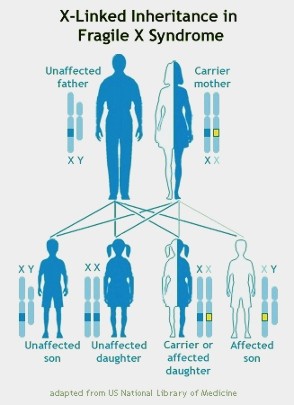Fragile X syndrome (FXS) is the most common inherited cause of autism and intellectual disabilities worldwide and at present, there is no cure.
Fragile X syndrome is a genetic disorder that occurs when a single gene on the X chromosome shuts down. This gene makes a protein needed for normal brain development. In FXS it does not work properly, the protein is not made, and the brain does not develop as it should.
FXS can affect both sexes. Females generally have milder symptoms than males, although there is a lot of variation and no good way to predict this. While most males have intellectual impairment, only one-third of females have significant intellectual challenges. The rest have either normal IQ or learning disabilities. Math is often a particular challenge for females. Emotional and behavioral problems are common in both sexes.
Both boys and girls may have delays in learning to speak, but most individuals with Fragile X are verbal. Lifespan for people with Fragile X syndrome is generally normal. Most affected people have active lifestyles and good health.
FRAXA Research Foundation is working to find specific treatments and ultimately a cure for Fragile X, but at present, there is no cure. Most males and many females with Fragile X syndrome are significantly affected throughout their lives. The cost to society for treatment, special education, and lost income is staggering. The need for research aimed at treatment is urgent.
Symptoms
- Intellectual disabilities, ranging from mild to severe.
- Attention deficit and hyperactivity, especially in young children.
- Anxiety and unstable mood.
- Autistic behaviors, such as hand-flapping and not making eye contact.
- Sensory integration problems, such as hypersensitivity to loud noises or bright lights.
- Speech delay, with expressive language more severely affected than receptive language.
- Seizures (epilepsy) affect about 25% of people with Fragile X syndrome.
Fragile X Prevalence and Inheritance
Sources do not agree on the prevalence of Fragile X syndrome, but recent estimates suggest 1 in 4,000 males and 1 in 8,000 females have FXS.
The Fragile X premutation can be passed silently down through generations in a family before a child is born with the syndrome.
- Women who carry Fragile X have a 50% chance of passing the mutated gene to each of her children. If she passes the affected gene, her children will either be carriers or they will have Fragile X syndrome.
- Men who carry Fragile X will pass the premutation to all their daughters but none of their sons. These daughters are carriers but they do not have Fragile X syndrome.

Fragile X and Autism
About 46% of males and 16% of females with Fragile X also have autism according to the CDC. Most boys and some girls have some symptoms of autism, but many are sociable and interested in other people. The key difference between the two disorders is that Fragile X is diagnosed by blood test and autism is diagnosed using a checklist of behaviors.
Treatment
There are many helpful educational and behavioral strategies, as well as Occupational Therapy (OT), Physical Therapy (PT), and Speech Therapy (SLP), to help. An extensive array of medications is available to manage symptoms.
Research
FRAXA Research Foundation has identified many pathways, biomarkers, and phenotypes which are now targets for potential Fragile X treatments. Our plan now is to discover and assess potential treatments and ultimately validate them in Fragile X clinical trials. Our goal is to get treatments to families that will improve the lives of those we love affected by Fragile X.
FRAXA-funded research has achieved significant breakthroughs, bringing us closer to finding new treatments.
There is hope.
We know that the Fragile X protein’s normal role is to help shape the connections between neurons (brain cells) that underlie learning and memory. Because absence of FMR protein delays the development of neurons, rather than destroying them, it is likely that treatments now being investigated will benefit all individuals with Fragile X, regardless of age.